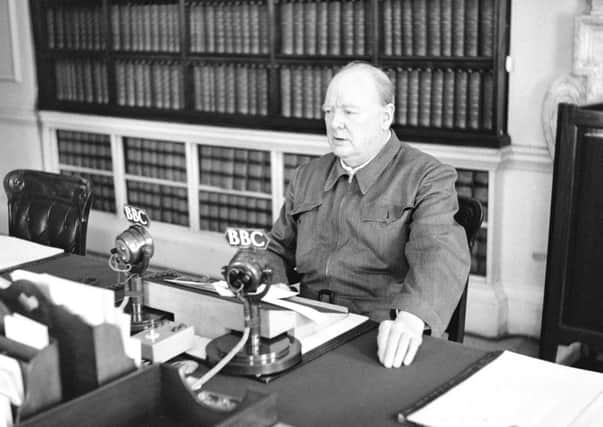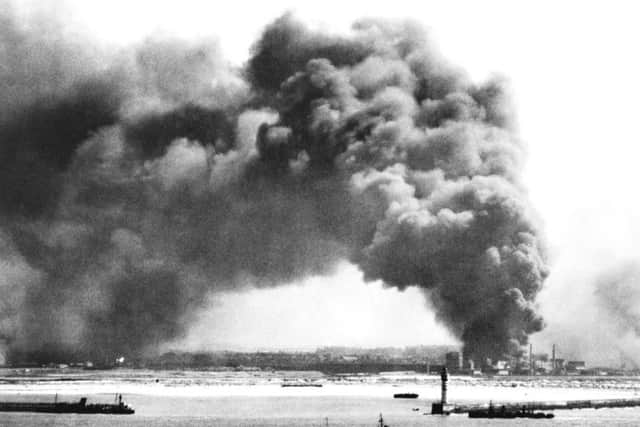William Wallace: No use evoking wartime spirit of Churchill or Dunkirk for a post-Brexit era


‘We beat the Germans in two world wars, and now they are telling us what to do’ is a sentiment I have heard on doorsteps, in bookshops and pubs since the referendum campaign began.
Advertisement
Hide AdAdvertisement
Hide AdWhen the German chief executive of Airbus remarked a fortnight ago that a disorderly Brexit would make it difficult to maintain its extensive manufacturing operations in Britain, Mark Francois MP, vice-chair of the Brexit-supporting European Research Group, denounced his ‘Teutonic arrogance’, and added: “My father was a D-Day veteran; he never submitted to any bullying, neither will his son.”


As we approach the possibility of crashing out of the EU, references to ‘the wartime spirit’ have shot up. Politicians have evoked Dunkirk, picturing a hard Brexit as a second desperate escape from the European continent.
Some have even suggested that small boats could help bring emergency medicines and food across the Channel. The Spectator recently carried a nostalgic article on rationing and wartime recipes – as if we would all relish the shortages we might face if ports are blocked, with the Women’s Voluntary Service distributing essential food for babies and perhaps even a new Home Guard.
Airbus is one of Britain’s major manufacturers; the sites on which it assembles aircraft parts began by building British aircraft before or during the last war.
Advertisement
Hide AdAdvertisement
Hide AdMargaret Thatcher’s government encouraged this Franco-German company to take over large elements of Britain’s aircraft-building capacity; the German and French governments wanted to retain their sovereignty over major defence manufacturers, but she was more relaxed about British industries falling under foreign control.
Similarly, the Thatcher government’s strategy for reviving the British motor industry relied on German, Japanese and French investment.
Hostility to Germany and Germans, oddly enough, no longer extends to the Japanese, also our enemies in the Second World War.
Margaret Thatcher worked particularly hard to bring Japanese investment into Britain, lobbying the Japanese Prime Minister repeatedly to persuade Tokyo banks and companies to commit to the British economy.
Advertisement
Hide AdAdvertisement
Hide AdSelective memory has reduced understanding of the 20th century to a contest between Britain and Germany for dominance, in which Britain won the wars but has somehow been cheated out of victory in peace.
Yet 1940 is looked back to as Britain’s finest hour, the Spitfire as the great symbol of Britain standing alone against Germany. Except that we never stood alone; even in the Battle of Britain there were 140 Polish pilots flying, together with 85 Czechs and 30 Belgians, as many as from the British Commonwealth.
And after 1945 we never regained the full sovereignty of which the British Empire had been so proud. The United States emerged from the war as our dominant partner; we were so grateful for the US keeping military bases in Britain that our government imposed few conditions, allowing the USA even today to move personnel in and out of listening stations like Menwith Hill without the British Parliament or most of its government being informed.
We were deep in debt to the United States, and after the war the largest recipient of American Marshall Aid. Here again, memories are selective, even false. Daniel Kawczynski, another hard Brexit MP, last week controversially tweeted that American aid had flowed only to Germany, and that Britain had contributed as well – suggesting that Germany had unfairly gained at Britain’s expense.
Advertisement
Hide AdAdvertisement
Hide AdLooking back, the Second World War may appear to be a golden age. Few alive can remember it directly; you have to be in your 80s to have experienced it even as a child. We were poorer, short of food, died younger, living in houses without central heating or inside toilets. Yes, we survived; I was born in an air raid, with my father in uniform and away most nights.
There was, I am told, a great sense of social solidarity – alongside the entrenched class divisions and the black market. But we can’t return to that era even if we wanted to – the British Empire has gone and the United States is no longer prepared to offer Britain a special relationship separate from our European neighbours.
With an open economy now substantially owned by others, we have to share sovereignty, and our democratic neighbours are the easiest to share with. Insulting the Germans may warm nationalist hearts, but it won’t make the Britain we will leave to our children more prosperous or more secure.
Lord Wallace of Saltaire is a Lib Dem peer and a former minister.